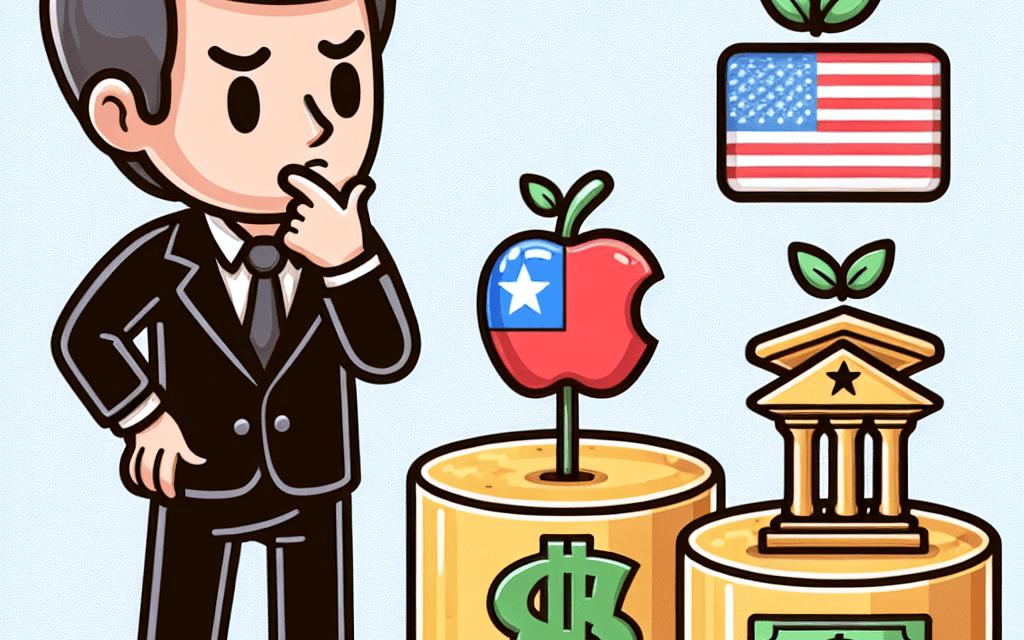“Buffett’s Timeless Trio: Stocks Built to Last Beyond Apple and Bank of America”
Introduction
Warren Buffett, the legendary investor and CEO of Berkshire Hathaway, is renowned for his strategic investment decisions and long-term approach to building wealth. Recently, Buffett made headlines by trimming his stakes in two major holdings: Apple and Bank of America. These moves have sparked interest and speculation among investors and market analysts, as both companies have been significant components of Berkshire Hathaway’s portfolio. However, amidst these adjustments, Buffett has consistently emphasized his commitment to certain “forever” stocks—companies that he believes possess enduring value and competitive advantages. These steadfast investments reflect Buffett’s investment philosophy of seeking businesses with strong fundamentals, reliable cash flows, and the potential for sustained growth over time. As the market continues to evolve, Buffett’s unwavering confidence in these select stocks underscores his belief in their ability to weather economic fluctuations and deliver long-term returns.
Warren Buffett’s Investment Strategy: A Closer Look
Warren Buffett, the legendary investor and chairman of Berkshire Hathaway, is renowned for his astute investment strategies and long-term vision. Recently, Buffett made headlines by trimming his stakes in Apple and Bank of America, two of the most significant holdings in his portfolio. This move has sparked discussions among investors and analysts, prompting a closer examination of Buffett’s investment strategy. While his decision to reduce positions in these giants may seem surprising, it aligns with his overarching philosophy of value investing and portfolio diversification.
Buffett’s approach to investing is characterized by a keen focus on intrinsic value and a preference for companies with strong fundamentals. His decision to trim Apple and Bank of America holdings does not necessarily indicate a lack of confidence in these companies. Instead, it reflects a strategic rebalancing of his portfolio to optimize returns and manage risk. Apple, despite being a technological powerhouse, faces challenges such as market saturation and increased competition. Similarly, Bank of America, while a robust financial institution, operates in a sector susceptible to economic fluctuations and regulatory changes. By reducing his stakes, Buffett is likely seeking to capitalize on gains while maintaining a balanced portfolio.
However, amidst these adjustments, there are certain stocks that Buffett considers as “forever keepers,” reflecting his unwavering confidence in their long-term potential. These stocks embody the qualities that Buffett values most: strong competitive advantages, consistent earnings growth, and capable management. One such stock is Coca-Cola, a company that has been a staple in Buffett’s portfolio for decades. Coca-Cola’s global brand recognition, extensive distribution network, and ability to adapt to changing consumer preferences make it a quintessential Buffett investment. The company’s resilience in the face of economic downturns and its commitment to shareholder returns through dividends further solidify its status as a forever keeper.
Another stock that Buffett holds in high regard is American Express. This financial services giant benefits from a strong brand, a loyal customer base, and a unique business model that combines credit card services with travel and lifestyle offerings. American Express’s ability to generate substantial fee income and maintain a high level of customer engagement aligns with Buffett’s preference for companies with sustainable competitive advantages. Moreover, the company’s focus on innovation and digital transformation positions it well for future growth, reinforcing its place in Buffett’s portfolio.
Lastly, Berkshire Hathaway itself is a testament to Buffett’s investment philosophy. As a conglomerate with diverse holdings across various industries, Berkshire Hathaway exemplifies the principles of diversification and long-term value creation. The company’s decentralized management structure allows its subsidiaries to operate independently while benefiting from the financial strength and strategic guidance of the parent company. This unique approach has enabled Berkshire Hathaway to consistently deliver strong returns to shareholders, making it a cornerstone of Buffett’s investment strategy.
In conclusion, Warren Buffett’s recent decision to trim his stakes in Apple and Bank of America underscores his commitment to prudent portfolio management and value investing. While these adjustments may raise questions, they are consistent with his long-standing investment principles. Meanwhile, his steadfast confidence in companies like Coca-Cola, American Express, and Berkshire Hathaway highlights his belief in their enduring potential. As investors seek to emulate Buffett’s success, understanding the rationale behind his investment choices offers valuable insights into the art of long-term investing.
The Significance of Trimming Apple and Bank of America Holdings
Warren Buffett, the legendary investor and CEO of Berkshire Hathaway, is renowned for his strategic investment decisions and long-term perspective on the stock market. Recently, Buffett made headlines by trimming his holdings in two major companies: Apple and Bank of America. This move has sparked considerable interest and speculation among investors and analysts alike, as both companies have been significant components of Berkshire Hathaway’s portfolio. Understanding the significance of these adjustments requires a closer examination of Buffett’s investment philosophy and the broader market context.
Apple, a technology giant, has been a cornerstone of Berkshire Hathaway’s portfolio for several years. Buffett’s decision to reduce his stake in Apple may seem surprising at first glance, given the company’s consistent performance and strong market position. However, it is essential to recognize that trimming a position does not necessarily indicate a lack of confidence in the company’s future. Instead, it can be a strategic move to rebalance the portfolio, manage risk, or capitalize on gains. In the case of Apple, the stock has experienced substantial appreciation, and reducing the position could be a prudent way to lock in profits while maintaining a significant investment in the company.
Similarly, the decision to trim holdings in Bank of America, one of the largest financial institutions in the United States, reflects a nuanced approach to portfolio management. The banking sector is subject to various economic and regulatory factors that can impact performance. By adjusting his stake, Buffett may be responding to changes in the financial landscape or seeking to optimize the allocation of capital within Berkshire Hathaway’s diverse portfolio. It is worth noting that even after these reductions, both Apple and Bank of America remain important components of the portfolio, underscoring Buffett’s continued belief in their long-term potential.
While these adjustments have garnered attention, it is equally important to consider the stocks that Buffett views as “forever keepers.” These are the companies that align closely with his investment principles, characterized by strong fundamentals, competitive advantages, and the potential for sustained growth. Among these, Coca-Cola, American Express, and Kraft Heinz stand out as enduring favorites. Coca-Cola, with its iconic brand and global reach, exemplifies the kind of business that Buffett admires for its ability to generate consistent cash flow and maintain a loyal customer base. American Express, a leader in the financial services industry, benefits from a robust network and a reputation for quality service, making it a valuable long-term holding. Kraft Heinz, despite facing challenges in recent years, represents a significant investment in the consumer goods sector, with the potential for recovery and growth.
In conclusion, Warren Buffett’s decision to trim his holdings in Apple and Bank of America should be viewed through the lens of strategic portfolio management rather than a lack of confidence in these companies. By making these adjustments, Buffett demonstrates his commitment to optimizing Berkshire Hathaway’s investments while maintaining a focus on long-term value creation. At the same time, his steadfast commitment to companies like Coca-Cola, American Express, and Kraft Heinz highlights the enduring qualities he seeks in his investments. As investors analyze these moves, they can gain valuable insights into Buffett’s approach and the principles that guide his investment decisions.
Understanding Buffett’s Forever Keepers in His Portfolio
Warren Buffett, the legendary investor and CEO of Berkshire Hathaway, is renowned for his long-term investment strategy and his ability to identify companies with enduring value. Recently, Buffett made headlines by trimming his stakes in Apple and Bank of America, two of the most significant holdings in his portfolio. While these moves might raise eyebrows, they are consistent with his investment philosophy of periodically rebalancing his portfolio to optimize returns. However, amidst these adjustments, there are certain stocks that Buffett seems to regard as “forever keepers,” reflecting his confidence in their long-term potential and resilience.
One of the quintessential examples of Buffett’s forever keepers is Coca-Cola. Buffett’s affinity for Coca-Cola is well-documented, and his investment in the company dates back to 1988. Over the years, Coca-Cola has demonstrated its ability to adapt to changing consumer preferences while maintaining its status as a global leader in the beverage industry. The company’s strong brand recognition, extensive distribution network, and consistent dividend payments make it a staple in Buffett’s portfolio. Moreover, Coca-Cola’s ability to innovate and expand its product offerings, such as its ventures into healthier beverage options, aligns with Buffett’s preference for companies that can sustain growth over the long term.
Another stock that Buffett holds with unwavering conviction is American Express. Buffett’s relationship with American Express began in the 1960s, and he has maintained a significant stake in the company ever since. American Express’s business model, which focuses on premium customers and offers a range of financial services, has proven to be resilient even in challenging economic environments. The company’s strong brand loyalty and its ability to generate substantial fee income from its cardholders are key factors that contribute to its enduring appeal. Furthermore, American Express’s strategic initiatives to expand its digital offerings and enhance customer experiences resonate with Buffett’s belief in companies that can adapt to technological advancements.
In addition to Coca-Cola and American Express, another stock that Buffett considers a forever keeper is Johnson & Johnson. Known for its diversified portfolio of consumer health products, pharmaceuticals, and medical devices, Johnson & Johnson has consistently demonstrated its ability to deliver steady growth and profitability. The company’s commitment to research and development, coupled with its strong pipeline of innovative products, positions it well for future success. Moreover, Johnson & Johnson’s robust financial health and its track record of increasing dividends make it an attractive investment for Buffett, who values companies with a history of returning capital to shareholders.
In conclusion, while Warren Buffett’s decision to trim his holdings in Apple and Bank of America may have captured attention, it is essential to recognize the stocks that he regards as forever keepers in his portfolio. Coca-Cola, American Express, and Johnson & Johnson exemplify the qualities that Buffett seeks in his investments: strong brand recognition, resilience in the face of economic challenges, and the ability to adapt to changing market dynamics. These companies not only align with Buffett’s long-term investment strategy but also reflect his confidence in their ability to generate sustainable value for shareholders. As such, they remain integral components of his portfolio, embodying the principles of enduring value and growth that have defined Buffett’s investment philosophy for decades.
The Impact of Buffett’s Decisions on the Stock Market

Warren Buffett, the legendary investor and CEO of Berkshire Hathaway, is renowned for his strategic investment decisions that often send ripples through the stock market. Recently, Buffett made headlines by trimming his stakes in two major companies: Apple and Bank of America. These moves have sparked discussions among investors and analysts, as they attempt to decipher the implications for the broader market. However, while Buffett’s adjustments in these high-profile stocks capture attention, it is equally important to consider the stocks he continues to hold steadfastly, which he regards as “forever keepers.”
Buffett’s decision to reduce his holdings in Apple and Bank of America may initially seem surprising, given the significant roles these companies play in Berkshire Hathaway’s portfolio. Apple, in particular, has been a cornerstone investment for Buffett, contributing substantially to the conglomerate’s earnings. Nevertheless, his decision to trim these positions should not be interpreted as a lack of confidence in their future prospects. Instead, it reflects Buffett’s disciplined approach to portfolio management, where he periodically reassesses and rebalances his investments to optimize returns and manage risk.
In contrast to the adjustments in Apple and Bank of America, Buffett’s unwavering commitment to certain stocks underscores his long-term investment philosophy. Among these “forever keepers” are Coca-Cola, American Express, and Kraft Heinz. These companies represent industries with enduring demand and possess strong competitive advantages, aligning with Buffett’s preference for businesses with predictable earnings and robust economic moats.
Coca-Cola, a staple in Buffett’s portfolio for decades, exemplifies his belief in the power of brand strength and global reach. The beverage giant’s ability to adapt to changing consumer preferences while maintaining its iconic status has ensured its resilience in the face of market fluctuations. Similarly, American Express, with its premium brand and loyal customer base, continues to thrive in the financial services sector. Buffett’s confidence in American Express is rooted in its ability to generate consistent cash flows and its strategic initiatives to expand its digital offerings.
Kraft Heinz, although facing challenges in recent years, remains a testament to Buffett’s faith in the potential for turnaround stories. The company’s focus on cost-cutting measures and innovation in product offerings aligns with Buffett’s strategy of investing in companies with the potential for long-term growth. By holding onto these stocks, Buffett demonstrates his belief in their ability to weather short-term volatility and deliver sustainable returns over time.
The impact of Buffett’s decisions on the stock market extends beyond the immediate fluctuations in share prices. His actions often serve as a barometer for investor sentiment, influencing market trends and shaping investment strategies. When Buffett trims or holds onto certain stocks, it prompts investors to reevaluate their own portfolios and consider the underlying principles guiding their investment choices.
In conclusion, while Warren Buffett’s recent adjustments in Apple and Bank of America have garnered attention, it is crucial to recognize the enduring value he places on his “forever keepers.” Coca-Cola, American Express, and Kraft Heinz exemplify his commitment to investing in companies with strong fundamentals and long-term growth potential. As investors navigate the complexities of the stock market, Buffett’s decisions serve as a reminder of the importance of a disciplined, long-term approach to investing, where the focus remains on enduring value rather than short-term fluctuations.
Analyzing the Long-Term Potential of Buffett’s Core Holdings
Warren Buffett, the legendary investor and CEO of Berkshire Hathaway, is renowned for his strategic approach to investing, often characterized by a long-term perspective and a focus on intrinsic value. Recently, Buffett made headlines by trimming his stakes in Apple and Bank of America, two of his most significant holdings. While these moves have sparked discussions among investors, it is crucial to delve deeper into the core holdings that Buffett seems to regard as forever keepers. These stocks, which have consistently demonstrated resilience and growth potential, offer valuable insights into Buffett’s investment philosophy and the long-term potential they hold.
One of the cornerstone stocks in Buffett’s portfolio is Coca-Cola. Buffett’s affinity for Coca-Cola is well-documented, and his investment in the company dates back to the late 1980s. The beverage giant has consistently delivered strong financial performance, driven by its iconic brand, global reach, and ability to adapt to changing consumer preferences. Coca-Cola’s extensive distribution network and diverse product offerings provide a robust foundation for sustained growth. Moreover, the company’s commitment to innovation and sustainability aligns with evolving market trends, ensuring its relevance in the years to come. As a result, Coca-Cola remains a quintessential example of a stock that embodies Buffett’s preference for businesses with enduring competitive advantages.
Another enduring fixture in Buffett’s portfolio is American Express. This financial services company has been a part of Berkshire Hathaway’s holdings for several decades, reflecting Buffett’s confidence in its business model and growth prospects. American Express benefits from a strong brand reputation, a loyal customer base, and a unique closed-loop network that allows it to capture valuable data on consumer spending patterns. These attributes enable the company to offer tailored services and maintain a competitive edge in the payments industry. Furthermore, American Express’s focus on premium customers and its ability to adapt to digital transformation trends position it well for future growth. Consequently, American Express exemplifies Buffett’s strategy of investing in companies with sustainable competitive advantages and robust growth potential.
In addition to Coca-Cola and American Express, another stock that Buffett appears to regard as a forever keeper is Moody’s Corporation. This credit rating agency plays a critical role in the global financial system by providing credit ratings, research, and risk analysis. Moody’s benefits from a high barrier to entry, as the credit rating industry is dominated by a few key players with established reputations. This oligopolistic market structure allows Moody’s to maintain pricing power and generate consistent revenue streams. Moreover, the increasing complexity of financial markets and the growing demand for credit ratings and risk assessment services further bolster Moody’s growth prospects. As such, Moody’s aligns with Buffett’s preference for companies with strong economic moats and the ability to thrive in various economic conditions.
In conclusion, while Warren Buffett’s recent decision to trim his stakes in Apple and Bank of America has garnered attention, it is essential to recognize the enduring value of his core holdings. Coca-Cola, American Express, and Moody’s Corporation exemplify Buffett’s investment philosophy, characterized by a focus on companies with sustainable competitive advantages, strong brand recognition, and the potential for long-term growth. These stocks not only reflect Buffett’s strategic vision but also offer valuable lessons for investors seeking to build resilient portfolios. As the investment landscape continues to evolve, the enduring appeal of these core holdings underscores the timeless wisdom of Buffett’s approach to investing.
Lessons from Buffett’s Approach to Portfolio Management
Warren Buffett, the legendary investor and CEO of Berkshire Hathaway, is renowned for his strategic approach to portfolio management. His recent decision to trim holdings in Apple and Bank of America has sparked interest and speculation among investors. However, while these adjustments may seem significant, they are part of a broader strategy that emphasizes long-term value and stability. Understanding Buffett’s approach offers valuable lessons for investors seeking to build a resilient portfolio.
Buffett’s decision to reduce stakes in Apple and Bank of America should not be misconstrued as a lack of confidence in these companies. Instead, it reflects his disciplined approach to maintaining a balanced portfolio. By periodically reassessing and adjusting his holdings, Buffett ensures that his investments align with his overarching strategy of value investing. This method involves identifying companies with strong fundamentals, competitive advantages, and the potential for sustainable growth. In doing so, Buffett demonstrates the importance of flexibility and adaptability in portfolio management.
Despite these adjustments, there are certain stocks that Buffett considers as “forever keepers” within his portfolio. These are companies that embody the principles of durability, strong market position, and consistent performance. Among these, Coca-Cola, American Express, and Kraft Heinz stand out as quintessential examples of Buffett’s investment philosophy. Each of these companies possesses unique attributes that align with Buffett’s criteria for long-term investment.
Coca-Cola, a staple in Buffett’s portfolio, exemplifies the power of brand strength and global reach. With its iconic status and extensive distribution network, Coca-Cola has maintained a dominant position in the beverage industry for decades. This enduring brand loyalty and market presence provide a reliable stream of revenue, making it a cornerstone of Buffett’s investment strategy. By investing in companies with such entrenched market positions, Buffett ensures a degree of stability and predictability in his portfolio.
Similarly, American Express represents another “forever keeper” due to its robust business model and strong customer base. As a leader in the financial services sector, American Express benefits from a loyal clientele and a reputation for quality service. This loyalty translates into consistent revenue streams and a competitive edge in the market. Buffett’s investment in American Express underscores the importance of choosing companies with a proven track record and the ability to adapt to changing market conditions.
Kraft Heinz, while facing challenges in recent years, remains a significant holding for Buffett due to its potential for turnaround and growth. The company’s portfolio of well-known brands and its efforts to innovate and streamline operations align with Buffett’s belief in the potential for value creation. By maintaining a stake in Kraft Heinz, Buffett demonstrates his commitment to investing in companies with the capacity for reinvention and long-term success.
In conclusion, Warren Buffett’s approach to portfolio management offers valuable insights for investors. His recent adjustments in Apple and Bank of America highlight the importance of flexibility and strategic rebalancing. Meanwhile, his steadfast commitment to companies like Coca-Cola, American Express, and Kraft Heinz underscores the value of investing in businesses with strong fundamentals and enduring market positions. By emulating Buffett’s principles of value investing and long-term thinking, investors can build portfolios that withstand market fluctuations and deliver sustainable returns.
The Future of Berkshire Hathaway’s Investment Strategy
Warren Buffett, the legendary investor and chairman of Berkshire Hathaway, has long been known for his astute investment strategies and his ability to identify companies with enduring value. Recently, Buffett made headlines by trimming Berkshire’s holdings in two of its most significant investments: Apple and Bank of America. While these moves have sparked discussions among investors and analysts, they also highlight Buffett’s dynamic approach to portfolio management. Despite these adjustments, there are certain stocks within Berkshire Hathaway’s portfolio that Buffett seems to regard as long-term keepers, reflecting his belief in their enduring potential.
Apple, a company that has been a cornerstone of Berkshire’s portfolio, saw a reduction in its shares. This decision may seem surprising given Apple’s consistent performance and its status as a tech giant. However, Buffett’s strategy often involves rebalancing the portfolio to optimize returns and manage risk. By trimming Apple, Buffett may be seeking to capitalize on its high valuation while maintaining a significant position in a company he still believes in. Similarly, the reduction in Bank of America shares could be seen as a tactical move to adjust exposure in the financial sector, especially in light of evolving economic conditions.
While these adjustments are noteworthy, they do not overshadow the steadfast commitment Buffett has shown to certain other investments. Among these are Coca-Cola, American Express, and Kraft Heinz, which have remained integral to Berkshire’s portfolio for decades. Coca-Cola, for instance, represents a classic Buffett investment: a company with a strong brand, global reach, and consistent cash flow. Buffett’s affinity for Coca-Cola is well-documented, and his long-term holding reflects his confidence in its ability to weather economic fluctuations and continue delivering value.
Similarly, American Express has been a staple in Berkshire’s portfolio, underscoring Buffett’s belief in the company’s robust business model and its capacity to adapt to changing consumer behaviors. The financial services giant has demonstrated resilience through various economic cycles, and its focus on customer loyalty and premium services aligns with Buffett’s investment philosophy of seeking companies with durable competitive advantages.
Kraft Heinz, although facing challenges in recent years, remains a significant holding for Berkshire. Buffett’s investment in Kraft Heinz is a testament to his belief in the potential for turnaround and growth in the consumer goods sector. Despite the hurdles, the company’s strong brand portfolio and efforts to innovate and streamline operations suggest a path to recovery that aligns with Buffett’s long-term investment horizon.
In conclusion, while Warren Buffett’s recent trimming of Apple and Bank of America shares may have caught the attention of the investment community, it is essential to view these moves within the broader context of Berkshire Hathaway’s investment strategy. Buffett’s approach is characterized by a balance between seizing opportunities and maintaining a core of enduring investments. Coca-Cola, American Express, and Kraft Heinz exemplify the types of companies that Buffett believes will continue to thrive over the long term. As Berkshire Hathaway navigates the complexities of the modern market, these “forever keepers” serve as a testament to Buffett’s enduring investment principles and his unwavering focus on long-term value creation.
Q&A
1. **Question:** What recent action did Warren Buffett take regarding his holdings in Apple and Bank of America?
– **Answer:** Warren Buffett recently trimmed his holdings in Apple and Bank of America.
2. **Question:** Why might Warren Buffett decide to trim his positions in certain stocks like Apple and Bank of America?
– **Answer:** Warren Buffett might trim positions to rebalance his portfolio, take profits, or adjust his investment strategy based on market conditions or company performance.
3. **Question:** What are the three stocks that Warren Buffett considers “forever keepers”?
– **Answer:** The three stocks considered “forever keepers” by Warren Buffett are Coca-Cola, American Express, and Berkshire Hathaway.
4. **Question:** Why is Coca-Cola considered a “forever keeper” by Warren Buffett?
– **Answer:** Coca-Cola is considered a “forever keeper” due to its strong brand, global presence, and consistent dividend payments, aligning with Buffett’s preference for stable, long-term investments.
5. **Question:** What makes American Express a “forever keeper” for Warren Buffett?
– **Answer:** American Express is a “forever keeper” because of its strong brand loyalty, competitive advantages in the financial services sector, and its ability to generate consistent earnings.
6. **Question:** How does Berkshire Hathaway fit into Warren Buffett’s “forever keeper” category?
– **Answer:** Berkshire Hathaway is a “forever keeper” as it is Buffett’s own company, representing a diversified portfolio of businesses and investments that align with his long-term investment philosophy.
7. **Question:** What is a common characteristic of the stocks Warren Buffett considers “forever keepers”?
– **Answer:** A common characteristic of these stocks is their strong brand recognition, consistent performance, and ability to generate reliable returns over the long term.
Conclusion
Warren Buffett’s decision to trim his holdings in Apple and Bank of America reflects a strategic reallocation of Berkshire Hathaway’s portfolio, focusing on long-term value and diversification. Despite these adjustments, Buffett’s commitment to certain “forever” stocks underscores his investment philosophy of holding onto companies with enduring competitive advantages, strong management, and consistent performance. These core holdings, often characterized by their resilience and potential for steady growth, align with Buffett’s approach of investing in businesses he understands deeply and trusts to deliver shareholder value over the long term.





